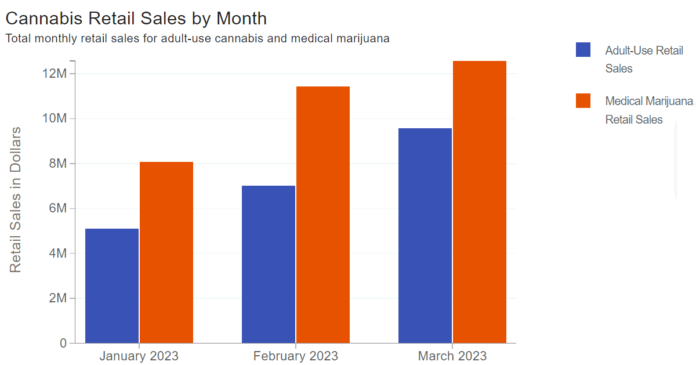Connecticut racked up more than an estimated $22 million in legal cannabis sales last month according to the state’s Department of Consumer Protection.
New data from the Department reveals that combined sales of adult-use cannabis and medical marijuana eclipsed a whopping $22 million between March 1 and March 31, 2023. The adult-use market contributed $9.6 million (excluding taxes), with medical marijuana sales hitting $12.6 million during the same timeframe. Medical marijuana patients do not pay taxes on the purchase of their medicine.
In March alone, medical marijuana patients bought 339,062 products, while adult-use consumers snapped up 234,974 items. The average price for a medical marijuana product stood at $37.06, with adult-use products slightly higher at $40.69.
This data was collected through the state’s Seed-to-Sale Tracking System, but adult-use and medical marijuana sales are now recorded in BioTrack.
While Connecticut became the 19th state to legalize recreational marijuana for adults 21 and older back in July 2021, retail sales from licensed retailers in the state didn’t kick off until January 10, 2023. This is probably why the adult sales were still lower than medicinal in March. Recreational cannabis tends to steal medical’s lunch once it becomes well established as patients have a tendency to gravitate towards adult-use products, which isn’t always the best outcome.
In Connecticut, a patient needs to be diagnosed by a state-licensed physician as having one of a wide range of qualifying conditions in order to access medical cannabis. Registered Connecticut patients have been able to home grow since late 2021. As at April 9, there were 46,849 patients registered in the state.
Adult-use purchases are capped at 1/4 ounce of raw flower or its equivalent, while medical marijuana patients can buy up to 5 ounces per month without any individual transaction limits.
There are three taxes on the retail sale of cannabis in Connecticut: the state’s usual 6.35 percent sales tax, a 3% municipal tax, and a 10-15% state cannabis tax based on THC content.
Further information on the state’s medical cannabis program can be found here, and on the adult use program here.


